Fengqing Paddy Flavor Raw Pu-erh Cake Tea 2006
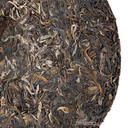 |
|
Commercial Description
...The taste of Fengqing Pu-erh is mellow and sweet, deeper than Pu-erh in other production area. And it usually has the flowery flavor of Dian Hong Tea....
Ratings & Reviews
Page 1 of 1 page with 2 reviews
 83 Aroma: 8/10 Flavor: 5/5 Value: 5/5
83 Aroma: 8/10 Flavor: 5/5 Value: 5/5Alex Zorach (1453 reviews) on Apr. 16th, 2013
I found this tea to be a very enjoyable Pu-erh, typical for its age and unusual only in the degree to which it produced a tingling and numbing sensation on the palate.
I received a sample which was a mostly-whole piece broken off a Pu-erh cake. The leaves were largely intact and it was very easy to break apart without further damaging the leaf.
Aroma of the dry leaf is smoky, but not overwhelmingly so, and somewhat suggestive of black tea (Keemun-like). Very slightly herbaceous, hinting at floral qualities but not quite. This tea isn't flowery in the way oolongs or green teas are, it's much more subtle. Earthy without being dusty. I found when I brewed it more strongly, the first infusion had tones of vanilla. I also found it slightly resembled grassy, hoppy beers in aroma. Like some aged Pu-erh, this tea also smells old, but more in an old books sort of way than the damp basement sensation I get from lower-quality ripened Pu-erh.
Very clean flavor. Crisp, mellow, and smooth...with a mild, pleasing bitterness, and little astringency. When brewing more strongly, I definitely notice the numbing sensation that homais described; in a milder cup it produces a sensation that I'd describe more as a mild stimulating effect on the palate, somewhat tingly. Reminiscent of Szechuan peppercorns.
I found this tea to infuse quickly; the leaves are loosely packed and unfurl quite quickly. TeaVivre recommends a 1-2 minute initial steeping, and I recommend aiming for the low end. I was able to make 4 infusions before the flavor gave out...but the fourth cup was almost as flavorful as the first.
I thought this tea was very reasonably priced for its age and quality. I recommend ordering a sample before buying it...it's 387 grams, which is a lot of tea if you don't like it, but I can't imagine many people would be disappointed. It's perfectly drinkable as-is but it's strong enough that I could see people continuing to age it as well.
 80 Aroma: 8/10 Flavor: 4/5 Value: 3/5
80 Aroma: 8/10 Flavor: 4/5 Value: 3/5homais (21 reviews) on Feb. 14th, 2013
I don't have a lot of experience with higher-end Pu Erh tea, so I don't have much to compare this to. In the past I've drank (and rather liked) the cheap stuff you find in Chinatown, the kind that smells fishy and tastes of dirt.
This tea was an altogether different experience for me. I didn't have much of it, so I followed the brewing instructions, which have much shorter steep times than I'm used to with the lower-end teas.
This is a complex beverage. The aroma is smoky, but not quote in the way lapsang teas are smoky. More like the smell of tea-smoked fish or tofu.There are floral notes as well, but very little of the wet earth smell I had expected.
I steeped this one many times, and as you'd expect for a tea this complex, it was a little different each time. Early on it was smooth and a bit peaty, with a taste that was floral, but more like marigold-floral than, say, red honeysuckle-floral. There was also a bit of earthiness - again, not very damp. Just earthy and a bit like leaves and hay - that served as counterpoint to the floral taste. It wasn't an aftertaste, though the earthiness always hit my tongue a fraction of a second after the floral taste, which is why I describe it as counterpoint. Throughout, there was also a pleasant, numbing, warming effect on my tongue, which inspired me to drink it more slowly than I usually do. Otherwise the numbness would have overpowered my ability to taste the tea.
With subsequent steepings, the floral taste faded and the earthy taste became more prominent, becoming a refreshingly bitter, warming brew that produced a mildly euphoric and energized state in me. It also, in fact, seemed to settle my stomach, which pu erh teas are known for doing. This may have been a placebo, but I don't care.
Again, I don't have much to compare this one to, but insofar as it's interesting, complex, makes you feel good, and doesn't have much of that tastes-like-dirt character that turns a lot of people off of this style of tea, I imagine it would be accessible for a lot of people, including someone who's just starting to learn about pu erhs.
Page 1 of 1 page with 2 reviews
More Raw (Sheng) Pu-erh from Fengqing, Yunnan, China from TeaVivre
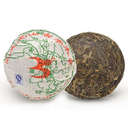
2006 Fengqing Raw Pu-erh Tea Tuocha
| Style: | Raw (Sheng) Pu-erh |
| Region: | Fengqing, Yunnan, China |
| Caffeine: | Caffeinated |
| Leaf: | Compressed |
88
3 Ratings
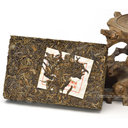
Fengqing Zhuan Cha Raw Puerh Brick Tea 2005
| Style: | Raw (Sheng) Pu-erh |
| Region: | Fengqing, Yunnan, China |
| Caffeine: | Caffeinated |
| Leaf: | Compressed |
57
3 Ratings
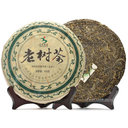
Fengqing Old Tree Raw Pu-erh Cake Tea 2013
| Style: | Raw (Sheng) Pu-erh |
| Region: | Fengqing, Yunnan, China |
| Caffeine: | Caffeinated |
| Leaf: | Compressed |
2 Ratings
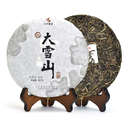
Fengqing Da Xue Shan (Big Snow Mountain) (2016)
| Style: | Raw (Sheng) Pu-erh |
| Region: | Fengqing, Yunnan, China |
| Caffeine: | Caffeinated |
| Leaf: | Compressed |
1 Rating

